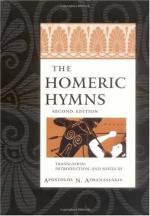Tree, and spring, and peaceful place with dance, song, and divine apparitions, all are Fijian, all are Greek, yet nothing is borrowed by Fiji from Greece. Many other Greek inscriptions cited by M. Foucart attest similar beliefs. Very probably such precepts as those of the Petilia scroll were among the secret instructions of Eleusis. But they are not so much Egyptian as human. Chibiabos is assuredly not borrowed from Osiris, nor the Fijian faith from the “Book of the Dead.” “Sacred things,” not to be shown to man, still less to woman, date from the “medicine bag” of the Red Indian, the mystic tribal bundles of the Pawnees, and the churinga, and bark “native portmanteaux,” of which Mr. Carnegie brought several from the Australian desert.
[Demeter and Persephone sending Triptolemos on his mission. Marble relief found at Eleusis—now in Athens: lang92.jpg]
For all Greek Mysteries a satisfactory savage analogy can be found. These spring straight from human nature: from the desire to place customs, and duties, and taboos under divine protection; from the need of strengthening them, and the influence of the elders, by mystic sanctions; from the need of fortifying and trying the young by probations of strength, secrecy, and fortitude; from the magical expulsion of hostile influences; from the sympathetic magic of early agriculture; from study of the processes of nature regarded as personal; and from guesses, surmises, visions, and dreams as to the fortunes of the wandering soul on its way to its final home. I have shown all these things to be human, universal, not sprung from one race in one region. Greek Mysteries are based on all these natural early conceptions of life and death. The early Greeks, like other races, entertained these primitive, or very archaic ideas. Greece had no need to borrow from Egypt; and, though Egypt was within reach, Greece probably developed freely her original stock of ideas in her own fashion, just as did the Incas, Aztecs, Australians, Ojibbeways, and the other remote peoples whom I have selected. The argument of M. Foucart, I think, is only good as long as we are ignorant of the universally diffused forms of religious belief which correspond to the creeds of Eleusis or of Egypt. In the Greek Mysteries we have the Greek guise,—solemn, wistful, hopeful, holy, and pure, yet not uncontaminated with archaic buffoonery,—of notions and rites, hopes and fears, common to all mankind. There is no other secret.
The same arguments as I have advanced against Greek borrowing from Egypt, apply to Greek borrowing from Asia. Mr. Ramsay, following Mr. Robertson Smith, suggests that Leto, the mother of Apollo and Artemis, may be “the old Semitic Al-lat.” {95a} Then we have Leto and Artemis, as the Mother and the Maid (Kore) with their mystery play. “Clement describes them” (the details) as “Eleusinian, for they had spread to Eleusis as the rites of Demeter and Kore crossing from Asia to Crete, and from Crete to the European peninsula.” The ritual “remained everywhere fundamentally the same.” Obviously if the Eleusinian Mysteries are of Phrygian origin (Ramsay), they cannot also be of Egyptian origin (Foucart). In truth they are no more specially of Phrygian or Egyptian than of Pawnee or Peruvian origin. Mankind can and does evolve such ideas and rites in any region of the world. {95b}




